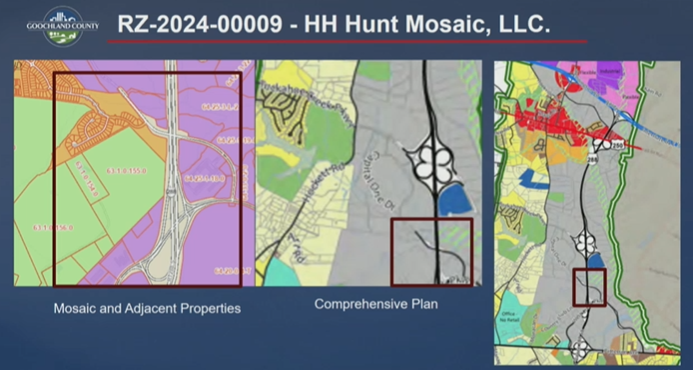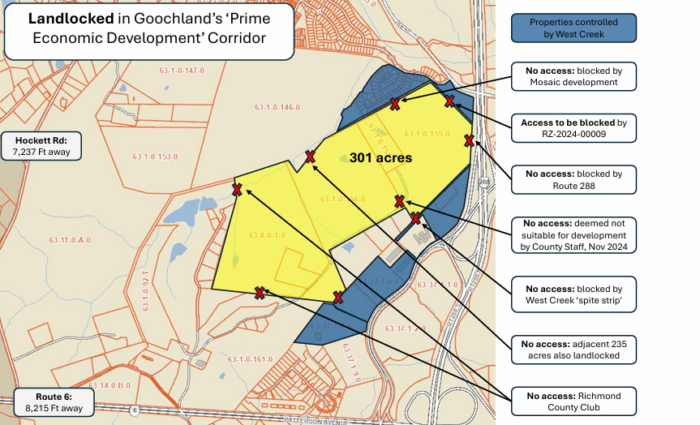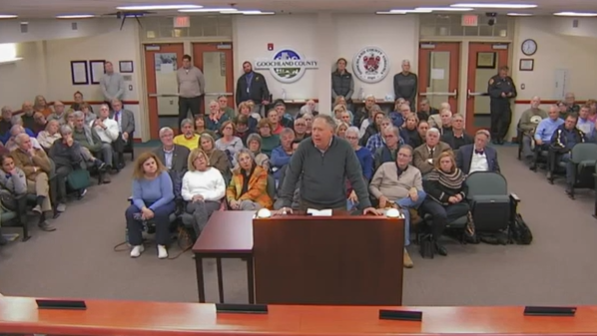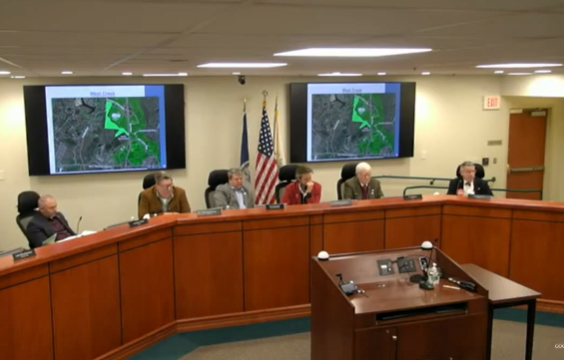A rezoning case that pitted neighboring West Creek-area landowners against one another passed easily through the Goochland County Board of Supervisors this week.
The board voted Tuesday 4-1 to approve the rezoning of 7 acres of excess land in the Mosaic at West Creek subdivision.
The decision clears a path for Mosaic developer HHHunt to add three townhomes to the 500-home neighborhood, but also controversially memorializes a provision to prevent construction of a road that a group of adjacent landowners say is vital for future development of their property.
The complaints of “landlocking” were lodged by members of the Haddock, Stern and Arenstein families who with others collectively own 1,000 acres that abut the western boundary of West Creek.
The families claim that while HHHunt put its name on the rezoning application, it was West Creek developer Pruitt Associates, namely managing partner Tommy Pruitt, that was behind the effort.
They claim Pruitt has sought to prevent competition to West Creek by blocking the families from getting access to the area’s prime interchanges, in this case Broad Branch Boulevard and its connection to Route 288.
Ric Arenstein, who with the Sterns own 170 of those 1,000 acres, spoke at Tuesday’s supervisors meeting, calling the road-related language in the rezoning application a “negative proffer.”
“As the public and the media have begun to understand, this case is not really about HHHunt wanting to add just three more lots to their community. Nor is it about the well-intended and understandable desire by the residents of their community to protect the environment in which they’ve invested and their lifestyle,” Arenstein said. “This case in part represents the latest effort in an attempt for 20 years by the developer of West Creek to prevent and discourage competition and to prevent our families and property owners from accessing critical roadways and obtaining sewer (access).”

Maps included in the rezoning case from HHHunt. The 7 acres in question are in orange in the left image and abut Route 288.
Arenstein added that the suggestion by some that the families seek out alternative road connections to Patterson Avenue to the south and Hockett Road to the west are unfeasible.
Dozens of Mosaic homeowners were also in attendance and several spoke to share their concerns about disruptions they thought the road could cause to their 55-and-up neighborhood and way of life.
Arenstein told those residents that his group has no objection to the three lots proposed in the rezoning, nor does his group have any desire to have a connection to the land through nearby Mosaic Creek Boulevard, which was a fear of the residents.
“Our only objection here tonight is to West Creek’s continued efforts to landlock Mr. Haddock’s property and devalue ours,” Arenstein said, referring to Ed Haddock, whose 300 acres sits immediately adjacent to the 7-acre parcel in question and is most affected by the rezoning.
“Those are not West Creek’s roads and they don’t belong to the people of Mosaic. They are public roads,” he said.
Gifford Hampshire, a local attorney representing the neighboring landowner families, reiterated the findings of county staff, that showed the rezoning went against the county’s comprehensive plan.
“(The Board) should not allow one rezoning application, driven by the profit motive of a single developer, to change the county’s de facto comprehensive plan that it has undertaken for decades,” Hampshire told the board.

A map included in materials submitted to the county by the Haddock family showing points at which their land has been blocked from road access.
Prior to their vote, none of the five supervisors asked questions of those in attendance, however two of the board members did speak at length.
First was Supervisor Jonathan Lyle, who represents the district in which the disputed property sits.
Lyle said he had spoken with representatives of the landowner families and had heard from dozens of Mosaic homeowners prior to the meeting.
Lyle admitted he was against Mosaic being built in the first place when it was first proposed nearly seven years ago because it was constructed on land that had been deemed by the comprehensive plan as “Prime Economic Development” land.
“I was not in favor of your community being developed. Maybe I shouldn’t say that, but I just did,” he said to the Mosaic contingent. “I thought prime economic development land should have been kept prime economic development.
Nevertheless, Lyle said, Mosaic now exists and the concerns of its existing residents must be taken into account.
“We do have different situation today. You’re here, you’re Goochlanders. What decision is in the best interest of the residents who live here versus future development of people who aren’t here today but would like to come here?”
Ultimately, Lyle, before offering the motion to vote in favor of the rezoning, said the spot at which the landowner families wish to build a road connection to Broad Branch Boulevard is in his opinion not a proper location.
“There may be a worse, less accommodating location for a connector road onto Broad Branch, but one would have to look really long and hard to find it,” he said. “It’s on a two-lane, blind curve downhill. So could that connector be done? Possibly. Should it be done? I don’t believe it should be.”
Supervisor Neil Spoonhower, the lone dissenting vote, also gave a lengthy soliloquy.
“I find it outrageous, quite honestly, that we’re sitting here talking about a negative proffer,” he said, then reciting certain county proffer rules verbatim. “It is my belief that this is an unreasonable proffer.”
Spoonhower likened the beef between the landowner families and Pruitt to a “Hatfield and McCoy situation,” while emphasizing his discomfort in setting a precedent of blocking access to prime economic development land.
“I’m not saying a road should go there, but what I am saying is there’s no way in good conscience this board should vote to prohibit a road from potentially going there. If we do accept this, we are limiting economic development. Economic development is our focus for the next four years. In order to keep Goochland rural, we have to have a strategy to put economic growth where it should, which is in the area that we’re talking about.”
Speaking with BizSense after Tuesday’s vote, Rick Cavenaugh, an associate of Haddock’s, said the families are considering their next steps.
“There are political steps, reaching out the neighbors, litigations steps. All of those are being considered.,” Cavenaugh said.
“I think it’s obvious that the county supervisors are kind of just glossing over comprehensive plans and 20 years of work and effort and a lot of money spent by the county on traffic and engineering plans,” he said. “We may need to do something to try to protect our interest that we think were violated.”
A rezoning case that pitted neighboring West Creek-area landowners against one another passed easily through the Goochland County Board of Supervisors this week.
The board voted Tuesday 4-1 to approve the rezoning of 7 acres of excess land in the Mosaic at West Creek subdivision.
The decision clears a path for Mosaic developer HHHunt to add three townhomes to the 500-home neighborhood, but also controversially memorializes a provision to prevent construction of a road that a group of adjacent landowners say is vital for future development of their property.
The complaints of “landlocking” were lodged by members of the Haddock, Stern and Arenstein families who with others collectively own 1,000 acres that abut the western boundary of West Creek.
The families claim that while HHHunt put its name on the rezoning application, it was West Creek developer Pruitt Associates, namely managing partner Tommy Pruitt, that was behind the effort.
They claim Pruitt has sought to prevent competition to West Creek by blocking the families from getting access to the area’s prime interchanges, in this case Broad Branch Boulevard and its connection to Route 288.
Ric Arenstein, who with the Sterns own 170 of those 1,000 acres, spoke at Tuesday’s supervisors meeting, calling the road-related language in the rezoning application a “negative proffer.”
“As the public and the media have begun to understand, this case is not really about HHHunt wanting to add just three more lots to their community. Nor is it about the well-intended and understandable desire by the residents of their community to protect the environment in which they’ve invested and their lifestyle,” Arenstein said. “This case in part represents the latest effort in an attempt for 20 years by the developer of West Creek to prevent and discourage competition and to prevent our families and property owners from accessing critical roadways and obtaining sewer (access).”

Maps included in the rezoning case from HHHunt. The 7 acres in question are in orange in the left image and abut Route 288.
Arenstein added that the suggestion by some that the families seek out alternative road connections to Patterson Avenue to the south and Hockett Road to the west are unfeasible.
Dozens of Mosaic homeowners were also in attendance and several spoke to share their concerns about disruptions they thought the road could cause to their 55-and-up neighborhood and way of life.
Arenstein told those residents that his group has no objection to the three lots proposed in the rezoning, nor does his group have any desire to have a connection to the land through nearby Mosaic Creek Boulevard, which was a fear of the residents.
“Our only objection here tonight is to West Creek’s continued efforts to landlock Mr. Haddock’s property and devalue ours,” Arenstein said, referring to Ed Haddock, whose 300 acres sits immediately adjacent to the 7-acre parcel in question and is most affected by the rezoning.
“Those are not West Creek’s roads and they don’t belong to the people of Mosaic. They are public roads,” he said.
Gifford Hampshire, a local attorney representing the neighboring landowner families, reiterated the findings of county staff, that showed the rezoning went against the county’s comprehensive plan.
“(The Board) should not allow one rezoning application, driven by the profit motive of a single developer, to change the county’s de facto comprehensive plan that it has undertaken for decades,” Hampshire told the board.

A map included in materials submitted to the county by the Haddock family showing points at which their land has been blocked from road access.
Prior to their vote, none of the five supervisors asked questions of those in attendance, however two of the board members did speak at length.
First was Supervisor Jonathan Lyle, who represents the district in which the disputed property sits.
Lyle said he had spoken with representatives of the landowner families and had heard from dozens of Mosaic homeowners prior to the meeting.
Lyle admitted he was against Mosaic being built in the first place when it was first proposed nearly seven years ago because it was constructed on land that had been deemed by the comprehensive plan as “Prime Economic Development” land.
“I was not in favor of your community being developed. Maybe I shouldn’t say that, but I just did,” he said to the Mosaic contingent. “I thought prime economic development land should have been kept prime economic development.
Nevertheless, Lyle said, Mosaic now exists and the concerns of its existing residents must be taken into account.
“We do have different situation today. You’re here, you’re Goochlanders. What decision is in the best interest of the residents who live here versus future development of people who aren’t here today but would like to come here?”
Ultimately, Lyle, before offering the motion to vote in favor of the rezoning, said the spot at which the landowner families wish to build a road connection to Broad Branch Boulevard is in his opinion not a proper location.
“There may be a worse, less accommodating location for a connector road onto Broad Branch, but one would have to look really long and hard to find it,” he said. “It’s on a two-lane, blind curve downhill. So could that connector be done? Possibly. Should it be done? I don’t believe it should be.”
Supervisor Neil Spoonhower, the lone dissenting vote, also gave a lengthy soliloquy.
“I find it outrageous, quite honestly, that we’re sitting here talking about a negative proffer,” he said, then reciting certain county proffer rules verbatim. “It is my belief that this is an unreasonable proffer.”
Spoonhower likened the beef between the landowner families and Pruitt to a “Hatfield and McCoy situation,” while emphasizing his discomfort in setting a precedent of blocking access to prime economic development land.
“I’m not saying a road should go there, but what I am saying is there’s no way in good conscience this board should vote to prohibit a road from potentially going there. If we do accept this, we are limiting economic development. Economic development is our focus for the next four years. In order to keep Goochland rural, we have to have a strategy to put economic growth where it should, which is in the area that we’re talking about.”
Speaking with BizSense after Tuesday’s vote, Rick Cavenaugh, an associate of Haddock’s, said the families are considering their next steps.
“There are political steps, reaching out the neighbors, litigations steps. All of those are being considered.,” Cavenaugh said.
“I think it’s obvious that the county supervisors are kind of just glossing over comprehensive plans and 20 years of work and effort and a lot of money spent by the county on traffic and engineering plans,” he said. “We may need to do something to try to protect our interest that we think were violated.”





They should have submitted site plans to the county showing the use of the road. Instead they waiting too long. You can’t request access to a road with an idea that it might be used at a future date unless it specifically says so in the deeds. Now they’re going to spend a fortune in court fighting this. The parties involved are savvy real estate families and should be evident to them.
Goochland is voting against its own interests again. It’s sad, but not surprising.